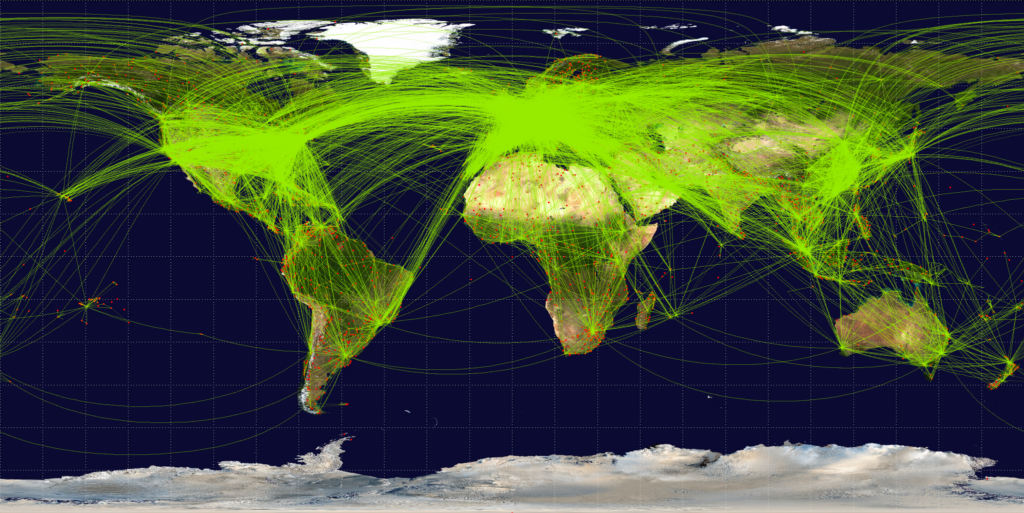Globalization

Credit: Jpatokal
Licence: CC-BY-SA-3.0,2.5,2.0,1.0 , via Wikimedia Commons
26 June 2009
| Giver: | - |
|---|---|
| Receiver: | Other |
| Gift: | - |
| Approach: | Other |
| Issues: | 16. Peace, Justice and Strong Institutions |
| Included in: | International Development |
The word “Globalization” has many meanings. Over the last several thousand years there have been several political and economic systems with remarkable reach, including the Silk Road trading network which emerged over 2200 years ago, and the European empires which had global impacts beginning in the 16th century. But usually, “Globalization” refers to a remarkable development beginning in the last third of the twentieth century. This set of interrelated economic, technological, and political changes has affected nearly everyone on the globe, and has had deep impacts on how we express and experience generosity.
The components of globalization include, among others:
- drastic reductions in trade barriers, which, alongside improved transportation, have led to a high degree of economic interdependence, even between rival nations;
- the startling growth of Multi-National Corporations, often (but not always) dominated by American economic interests;
- the creation of multi-lateral institutions such as the World Trade Organization;
- the rise of the World Wide Web, which has made instantaneous communication and information transfer possible even for many ordinary private citizens; and
- the emergence of global, cross-cultural trends in cinema, music, literature, and social media.
Globalization has fostered cultural collaboration, the global flow of capital, and economic specialization, contributing to a more interconnected and collaborative world. Multinational corporations, by employing a diverse global workforce, encourage the fusion of cultures and the exchange of skills and knowledge, enriching the global market. This diversity not only promotes a broader understanding and empathy towards other cultures but also facilitates the global sharing of technological advances and innovations, speeding up the pace at which knowledge and technology spread worldwide.
The economic integration and partnerships formed between countries have improved living conditions and access to resources on a global scale, demonstrating globalization’s potential to act as a catalyst for generosity and international collaboration. The cultural exchange that comes with globalization, including the sharing of values, music, and cuisine, further nurtures a sense of global community and empathy among peoples from different backgrounds.
However, the benefits of globalization are tempered by its foundations in structural inequalities, particularly between the Global North and South, posing challenges to achieving genuine global collaboration and generosity. The historical context of globalization, rooted in colonialism and unequal international relations, continues to impact the distribution of wealth and opportunities, with the developed North often benefiting more than the developing South. Indeed, critics often characterize globalization as American empire under a different name. This imbalance exacerbates issues like labor exploitation, human trafficking, and the plight of migrants and refugees, highlighting the darker aspects of globalization that undermine its potential for fostering global generosity.
In the modern era, globalization offers unprecedented opportunities for cross-border generosity and support, such as international aid during crises, global initiatives addressing issues like disease prevention and human trafficking, and, perhaps most important, the international transfer of funds from immigrant workers in the North to family members in their home countries. However, the underlying inequalities that globalization perpetuates must be addressed if we are to fully harness its capacity for fostering a more generous and equitable world. The challenge lies in transforming the global interconnectedness into a force for good, one that not only facilitates economic and cultural exchanges but also promotes a more inclusive form of global generosity that transcends the barriers created by centuries of inequality. While globalization provides new possibilities for generosity, it also reinforces the inequalities which generosity seeks to mitigate.
Contributor: Maha Tazi
| Source type | Full citation | Link (DOI or URL) |
|---|---|---|
| Book |
Albrow, Martin; King, Elizabeth. Globalization, Knowledge and Society. Sage, 1990. |
ISBN 0-8039-8323-9. |
| Publication |
Dollar, David; Kraay, Aart. “Trade, Growth, and Poverty”. Finance and Development. International Monetary Fund, 2011 |
https://www.imf.org/external/pubs/ft/fandd/2001/09/dollar.htm |
| Book |
Frank, Andre Gunder. ReOrient: Global economy in the Asian age. University of California Press, 1998 ISBN 978-0-520-21474-3 |
ISBN 978-0-520-21474-3 |
| Publication |
O’Rourke, Kevin; G., Williamson, Jeffrey. “When did globalization begin?”. European Review of Economic History. 6 no. 1 (2002): 23–50. |
|
| Book |
Ritzer, George. Globalization: The Essentials. John Wiley & Sons, 2011 |
- |